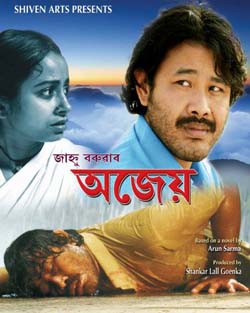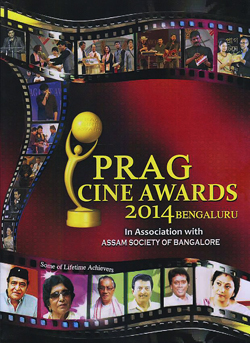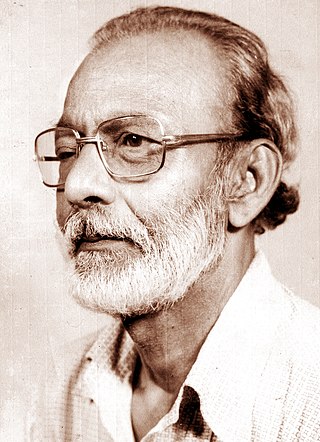
Assamese cinema is the Indian film industry of Assamese language. It is based in Assam, India. The industry was born in 1935 when Jyoti Prasad Agarwala released his movie Joymoti. Since then the Assamese cinema has developed a slow-paced, sensitive style. In the beginning the industry were called Jollywood, for Agarwala's Jyoti Chitraban Film Studio.

Joymoti is a 1935 Indian film widely considered to be the first Assamese film ever made. Based on Lakshminath Bezbaroa's play about the 17th-century Ahom princess Joymoti Konwari, the film was produced and directed by the noted Assamese poet, author, and film-maker Jyoti Prasad Agarwala, and starred Aideu Handique and acclaimed stage actor and playwright Phani Sarma. The film, shot between 1933 and 1935, was released by Chitralekha Movietone on 10 March 1935 1935 and marked the beginning of Assamese cinema.

Kerala State Motion Picture Academy is an autonomous non-profit institution based in Trivandrum, working under the Department of Cultural Affairs, Government of Kerala. It was founded in August 1998 for the promotion of cinema in Kerala, considering that cinema is the most popular art form in the state. The academy was first of its kind in India; it was formed on the basis of the Karant committee report (1980), which proposed the formation of a national film academy. Under the leadership of T. K. Ramakrishnan, The Minister for Cultural Affairs appointed Shaji N. Karun as its first chairman.

Jatin Bora is an Indian actor and director who has appeared in Assamese language films since 1989. He is also an actor and director in some mobile theatre (Bhramyaman) groups of Assam, including Aabahan, Hengool, Ashirbaad, Bhagyadevi, Kohinoor, Itihas and Surjya.

Chitra Chinta is an annual cine journal published by Gauhati Cine Club. The journal is the brainchild of Bhabendra Nath Saikia, noted Assamese filmmaker who started publishing it in the early part of the last century. It was an irregularly published newsletter until 2003 when it was redesigned as an annual magazine. It covers contributions from all the stalwarts of Assamese literature and film critics. The journal won the prestigious Prag Cine Award.

Perspectives on Cinema of Assam is a book on the history of cinema of Assam, edited by Manoj Borpujari and Dr Garima Kalita. The book was published by Gauhati Cine Club in 2008. The book has a number of articles written by well-known authors who have traced the evolution of cinema in Assam from its birth to the contemporary stage including Documentary and the growth of the film industry. There is also an exclusive article on the Film Society Movement in Assam with a documentation of the entire list of films made in Assam from 1935 to 2007.
Pabitra Kumar Deka was a progressive writer, columnist, publisher and editor of monthly magazine, film critic and screenwriter of the State of Assam in India. He is the winner of the Best Film Critic Award in 1988 from the Eastern India Motion Picture Association. The Government of Assam has instituted the State Best Film Critic Award in the name of Pabitra Kumar Deka Award from 2010 after his death.

Ajeyo is a 2014 Assamese language drama film directed by Jahnu Barua; based on the Sahitya Akademi Award winner 1997 Assamese novel Ashirbador Rong written by Arun Sharma and adapted as screenplay by the director himself. It was produced by Shankar Lall Goenka and stars Rupam Chetia and Jupitora Bhuyan in the lead roles. The film was released on 3 January 2014.

The Prag Cine Awards 2014 ceremony, presented by the Prag Network, honored the actors, technical achievements, and films censored in 2013 from Assam and took place on 22 March 2014, at the Koramangala Indoor Stadium in Bangalore, India. Actors duos Kopil Bora and Zerifa Wahid hosted the show. Veteran litterateur Arun Sharma, Kannada film director Nagathihalli Chandrashekhar and Bollywood film actress Mahima Chaudhary inaugurated the event.
Prodyut Kumar Deka is an Indian film & stage director, screenwriter and author residing in Assam, India. His films include Dhunia Tirutabur, Samiran Barua Ahi Ase, Surjasta, Borosi, Chiyahir Rong, Ji Golpor Ses Nai and The Government Servant.
Girijananda Chowdhury Institute of Management and Technology, Tezpur (GIMT-Tezpur) is a private institute offering degree level technical courses in the State of Assam is a Private college established by Shrimanta Shankar Academy (SSA) Society and Government of Assam, India. The college was established with permission from the state government and approval from the All India Council for Technical Education (AICTE), New Delhi and is affiliated to Gauhati University (GU), Guwahati, Assam and also to Assam Science and Technology University (ASTU), Guwahati, Assam.

Dr. Bobby Sarma Baruah is a national and international award-winning Indian filmmaker, producer and screenwriter whose narrative content on socio-cultural issues in Assam and the Northeast India has been highly appreciated. Her debut feature film Adomya in which she explored the sensitivity and emotional world of women was awarded the best film in the spiritual category at the 13th Dhaka International Film Festival.
Atul Chandra Barua was the 46th president of Asam Sahitya Sabha and a prominent name in the modern Assamese literature. He was an ACS officer and an Assamese writer. He worked for the cause of Darrangi culture and was conferred with the title "Darrang Ratna".

The Guwahati International Film Festival (GIFF) is an annual film festival held in Guwahati, Assam, India. The State Government-owned Jyoti Chitraban (Film Studio) Society organised the festival in association with the Dr. Bhupen Hazarika Regional Government Film and Television Institute. The first ever Guwahati International Film Festival (GIFF) to be held in northeast India, which will be inaugurated on 28 October 2017 by Assam Chief Minister Sarbananda Sonowal. The Assam government supported festival began on 28 October with screening of the Oscar winning ‘The Salesman’, directed by Asghar Farhadi and produced by a joint collaboration of Iran and France.
Jwlwi - The Seed is a 2019 Bodo-language Indian film directed by Rajni Basumatary. Set in Assam's insurgency ridden 90s, Jwlwi- The Seed is "a story of hope lost and found through resolute perseverance even in the face of seemingly insurmountable odds."
Surjya Kanta Hazarika is an Assamese litterateur, an eminent scholar, author, journalist, poet, publisher, playwright, lyricist, composer, cultural activist, feature film and documentary maker, social worker and philanthropist. Hazarika is a recipient of the Padma Shri Award in 2008 for his contribution to Literature & Education. He is the current president of Asam Sahitya Sabha.

Asu Dev(আশু দেব), born as Ashutosh Deb Dhubri, Assam, India was a pioneer artist of Assam. He was a painter, sculptor and an Art Educator. During his lifetime he had worked as a Textile Designer in several Cotton Mills in Jessore and Khulna in Bangladesh, Ahmedabad, Surat, Kolkata, at the Janata College Titabor Assam and Assam Textile Institute Guwahati, Assam and at Weavers Training Centre in Dimapur Nagaland in the later part of his life. His distinguished style of painting, where he had experimented using fine and minute dots often like modern pixels, which was often addressed by art critics as pointillism. Asu Dev was a self taught artist who created his artworks from minute observation of the Nature and the working class, and his innate exposure to Srimanta Sankardeva the 15th–16th century Assamese saint-scholar, poet, playwright, artist and social-religious reformer. The miniature paintings from the Chitra Bhagawata and the traditional folk arts and culture of the region, becoming the prime subjects of his paintings. During his career spanning about fifty years of Artistic career dating to the 1930s, he had created around 180 Art works, mostly paintings, oil on canvas, water colour tempara, textile designs and motifs, illustrations, sketches, drawings and a few sculptures. In 1952, Asu Dev was among the first artists to hold, one man show in Assam.

Ellora Vigyan Mancha is a non- profitmaking, non-governmental organization established in May 2004 in Assam, India, to Spread scientific temper and to fight superstition and blind belief, launch campaigns and movement for health awareness, climate change, encourage blood donation/ eye donation/ other human organ(s) donation/ whole body donation after death for transfusion, transplantation or medical research., and to Instill a sense of fraternity in people through selfless humanitarian service.

Subrat Jyoti Neog is a Film Critic, a Theatre Critic and a Playwright from the Indian state of Assam. He teaches in Tezpur University at the department of Assamese as an associate professor.












